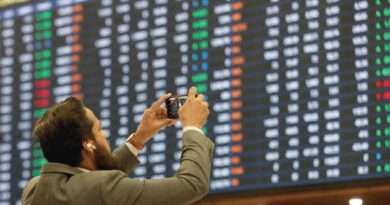Policy making in Pakistan: The Wrong Choices and How to Correct Them
|
Getting your Trinity Audio player ready...
|
Pakistan’s economic struggles have persisted for decades, largely due to persistent flawed policymaking. These policies, far from bringing prosperity, have instead deepened the nation’s economic crisis. It’s time to rethink our approach if we are to secure long-term growth and stability.
The Vicious Cycle of Economic Mismanagement
Pakistan’s economy has been trapped in a vicious cycle of slow growth, high taxes, and unsustainable budget deficits, leading to an ever-increasing debt burden. Despite participating in multiple International Monetary Fund (IMF) programs over the years, Pakistan continues to face the same economic challenges: a sluggish economy, inflationary pressures, and a worsening balance of payments crisis.
Politicians and bureaucrats have been following short-term solutions, commonly referred to as “whack-a-mole” measures, which fail to address the root causes of the nation’s economic malaise. This cycle has trapped the country in a pattern of instability, making it difficult to break free.
The Key to Overcoming This Crisis: Supply-Side Economic Policies
The solution to Pakistan’s woes lies in adopting a comprehensive, supply-side economic agenda that promotes long-term growth. Here are the crucial policy shifts that Pakistan needs to embrace:
Tax Rationalisation: A Need for Reforms
One of the foundational aspects of a supply-side economy is tax reform. Pakistan needs to establish a simplified and rationalised tax system, with low rates, a broad tax base, and no exemptions or exclusions. This would create a more efficient system, where tax rates are lower but the overall tax base is broader, leading to higher revenue collection without discouraging business activity.
The Laffer Curve and Its Implications
A key principle behind these tax reforms is the Laffer Curve, which posits that tax cuts can sometimes increase tax revenue by spurring economic activity. Lower tax rates on a broad base increase work, savings, and investment, while simultaneously reducing tax evasion and avoidance. Pakistan needs to focus on such pro-growth tax policies to generate more revenue without stifling business growth.
The Importance of Free Trade for Economic Growth
Free trade is essential for any economy looking to grow in the long term. Low tariffs and unrestricted access to international markets foster economic growth, allowing importers, exporters, consumers, and producers to benefit. Free trade helps a country increase its total trade volume (both imports and exports), thus leading to better economic prospects for all stakeholders.
Breaking the Myth of Trade Deficits
Many people erroneously believe that a trade deficit is inherently harmful. However, the trade deficit myth has been debunked by economic research. A trade deficit occurs when a country imports more than it exports, but this isn’t necessarily bad. In fact, nations that embrace free trade often experience stable currencies, healthy capital inflows, and sustained economic growth.
Understanding the capital surplus—the difference between what a country imports and what it produces—is critical to grasping the full impact of trade imbalances. A capital surplus is often linked with a trade deficit and should be considered a positive sign of economic growth rather than a negative one.
The Need for Fiscal Restraint and Austerity
Excessive government spending is another major problem. When the government spends more than it collects in taxes, it creates inefficiencies that hinder economic performance. Pakistan has been plagued by unsustainable fiscal deficits, and the result is a bloated debt servicing burden that eats up a significant portion of its tax revenues.
The Role of the Private Sector in Economic Growth
The private sector plays a pivotal role in creating wealth, jobs, and investment opportunities. Unfortunately, over-reliance on the public sector for job creation stifles innovation and wealth generation. When the government crowds out the private sector by over-borrowing and over-spending, it hampers the economy’s ability to thrive.
The private sector is the true engine of growth in any economy, and Pakistan must prioritize private investments and businesses. Additionally, Pakistan should foster an environment that is conducive to foreign direct investment (FDI), creating opportunities for growth and foreign exchange reserves.
Monetary Policy: Managing the Currency
Monetary and fiscal policies must work in harmony to promote economic stability. Unstable currency values and inflationary pressures have caused significant harm to Pakistan’s economy. The rupee’s volatility, primarily driven by government borrowing and money printing by the State Bank of Pakistan, has negatively impacted businesses, households, and government budgets.
The Importance of a Sound Monetary Policy
A sound monetary policy involves controlling money supply and keeping interest rates low. This helps prevent inflation and stabilizes the currency. It also boosts economic growth, encourages investment, and fosters business confidence. Pakistan must focus on building an economic framework that prevents currency depreciation and hyperinflation from eroding the purchasing power of its citizens.
Privatisation: Unlocking Value from State-Owned Enterprises
Pakistan has a number of state-owned enterprises (SOEs) that are a drain on the national treasury. These SOEs, many of which have become inefficient and corrupt, need to be privatised. Privatisation would not only reduce the burden on the government’s finances but also create a more dynamic economy where resources are allocated based on market signals rather than political motives.
Lessons from Global Privatisation Successes
Countries around the world have successfully privatised inefficient public enterprises to unlock value and improve services. Pakistan should follow the lead of these nations and sell off its SOEs to private investors, ensuring transparency and fairness in the process. The goal should be to create competitive and efficient industries that can drive economic growth.
Debt Restructuring: Avoiding a Financial Collapse
Pakistan’s debt burden is another critical issue that must be addressed. The nation needs to restructure its international and domestic debt to avoid a crisis. Debt restructuring involves negotiating with lenders to extend payment terms, reduce interest rates, or even reduce the total debt burden in exchange for more manageable terms.
Preventing a Default Crisis
Without debt restructuring, Pakistan will continue to face a debt servicing crisis. More importantly, the country must work with international creditors to avoid a sudden default, which could trigger a financial crisis and a collapse of the banking sector.
ALSO READ:
FAQs on Pakistan’s Economic Policymaking
1. Why is Pakistan’s economy in such a poor state?
Pakistan’s economy suffers from poor policymaking, over-reliance on government spending, an inefficient tax system, and an unstable currency. These issues have created a vicious cycle that has hindered growth and stability.
2. What is the Laffer Curve and why does it matter?
The Laffer Curve suggests that lower tax rates can stimulate economic activity and increase government revenue by encouraging investment, work, and savings.
3. How can free trade help Pakistan’s economy?
Free trade fosters competition, innovation, and access to new markets. It leads to higher economic growth and benefits all sectors of the economy.
4. What is fiscal restraint and why is it important for Pakistan?
Fiscal restraint means limiting government spending to what can be sustainably funded through tax revenues. It is crucial for avoiding excessive debt and ensuring the country can invest in essential infrastructure and services.
5. How does privatisation help Pakistan?
Privatisation can make state-owned enterprises more efficient and reduce the financial burden on the government, allowing the private sector to lead economic growth and development.
Conclusion
Pakistan’s economic future lies in its ability to make the right policy choices. By focusing on tax rationalisation, free trade, sound monetary policies, and privatisation, Pakistan can begin the long process of healing its economy. However, without these significant changes, the nation will continue to fall further into economic disarray.




